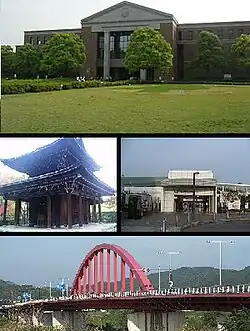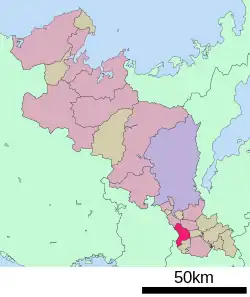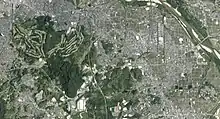Kyōtanabe, Kyoto
Kyōtanabe (京田辺市, Kyōtanabe-shi) is a city located in the southern part of Kyoto Prefecture, Japan. As of 1 September 2023, the city has an estimated population of 71,757 in 31555 households and a population density of 1700 persons per km².[1] The total area of the city is 42.92 square kilometres (16.57 sq mi).
Kyōtanabe
京田辺市 | |
|---|---|
 Top:A campus of Doshisha University, Middle left:Shuonan Temple, Middle right:Matsui Yamate Station, Bottom:Yamashiro Bridge | |
 Flag  Emblem | |
Location of Kyōtanabe in Kyoto Prefecture | |
 | |
 Kyōtanabe Location in Japan | |
| Coordinates: 34°48′52″N 135°46′04″E | |
| Country | Japan |
| Region | Kansai |
| Prefecture | Kyoto |
| Government | |
| • Mayor | Takashi Kamimura (since April 2019) |
| Area | |
| • Total | 42.92 km2 (16.57 sq mi) |
| Population (September 1, 2023) | |
| • Total | 71,757 |
| • Density | 1,700/km2 (4,300/sq mi) |
| Time zone | UTC+09:00 (JST) |
| City hall address | Tanabe 80, Kyōtanabe-shi, Kyoto-fu 610-0393 |
| Climate | Cfa |
| Website | Official website |
| Symbols | |
| Flower | Rhododendron pulchrum |
| Tree | Triadica sebifera |

Geography
Kyōtanabe is located in southern Kyoto Prefecture, bordered by Osaka Prefecture and Nara Prefecture. It is one of the three "Kansai Cultural and Academic Research City municipalities". The city is sandwiched between the Kizugawa River, which runs north-south on the east side of the city, and the Ikoma Mountains on the west.
Neighboring municipalities
Climate
Kyōtanabe has a humid subtropical climate (Köppen Cfa), featuring a marked seasonal variation in temperature and precipitation. Summers are hot and humid, but winters are relatively cold with occasional snowfall. The average annual temperature in Kyōtanabe is 15.3 °C (59.5 °F). The average annual rainfall is 1,429.8 mm (56.29 in) with June as the wettest month. The temperatures are highest on average in August, at around 27.5 °C (81.5 °F), and lowest in January, at around 4.1 °C (39.4 °F).[2] Its record high is 39.0 °C (102.2 °F), reached on 16 August 2007, and its record low is −6.8 °C (19.8 °F), reached on 27 February 1981.[3]
| Climate data for Kyōtanabe (1991−2020 normals, extremes 1978−present) | |||||||||||||
|---|---|---|---|---|---|---|---|---|---|---|---|---|---|
| Month | Jan | Feb | Mar | Apr | May | Jun | Jul | Aug | Sep | Oct | Nov | Dec | Year |
| Record high °C (°F) | 17.6 (63.7) |
22.4 (72.3) |
25.9 (78.6) |
30.6 (87.1) |
33.5 (92.3) |
37.5 (99.5) |
38.5 (101.3) |
39.0 (102.2) |
37.0 (98.6) |
32.7 (90.9) |
26.5 (79.7) |
23.3 (73.9) |
39.0 (102.2) |
| Average high °C (°F) | 9.1 (48.4) |
10.0 (50.0) |
13.9 (57.0) |
19.9 (67.8) |
24.9 (76.8) |
28.0 (82.4) |
31.8 (89.2) |
33.4 (92.1) |
29.0 (84.2) |
23.2 (73.8) |
17.2 (63.0) |
11.6 (52.9) |
21.0 (69.8) |
| Daily mean °C (°F) | 4.1 (39.4) |
4.6 (40.3) |
8.0 (46.4) |
13.5 (56.3) |
18.6 (65.5) |
22.6 (72.7) |
26.5 (79.7) |
27.5 (81.5) |
23.4 (74.1) |
17.4 (63.3) |
11.3 (52.3) |
6.2 (43.2) |
15.3 (59.6) |
| Average low °C (°F) | −0.6 (30.9) |
−0.4 (31.3) |
2.3 (36.1) |
7.2 (45.0) |
12.6 (54.7) |
18.0 (64.4) |
22.4 (72.3) |
23.0 (73.4) |
18.9 (66.0) |
12.4 (54.3) |
6.2 (43.2) |
1.4 (34.5) |
10.3 (50.5) |
| Record low °C (°F) | −6.6 (20.1) |
−6.8 (19.8) |
−4.1 (24.6) |
−2.1 (28.2) |
0.2 (32.4) |
6.7 (44.1) |
13.8 (56.8) |
14.5 (58.1) |
9.1 (48.4) |
2.6 (36.7) |
−1.8 (28.8) |
−5.1 (22.8) |
−6.8 (19.8) |
| Average precipitation mm (inches) | 51.0 (2.01) |
63.4 (2.50) |
108.0 (4.25) |
106.8 (4.20) |
141.0 (5.55) |
204.2 (8.04) |
181.5 (7.15) |
152.3 (6.00) |
156.9 (6.18) |
140.0 (5.51) |
74.0 (2.91) |
56.9 (2.24) |
1,429.8 (56.29) |
| Average precipitation days (≥ 1.0 mm) | 6.0 | 6.6 | 10.0 | 10.0 | 9.9 | 12.0 | 11.4 | 8.7 | 10.7 | 9.4 | 6.7 | 6.5 | 107.9 |
| Mean monthly sunshine hours | 130.5 | 127.8 | 167.2 | 186.3 | 201.9 | 155.0 | 170.9 | 216.7 | 163.3 | 162.8 | 141.4 | 138.0 | 1,961.8 |
| Source: Japan Meteorological Agency[3][2] | |||||||||||||
Demographics
Per Japanese census data, the population of Kyōtanabe in 2020 is 73,753 people.[4] Kyōtanabe's population has increased roughly sevenfold over the past century. The city has grown almost continuously since the census began in 1920, and saw especially rapid growth in the late 20th century.
|
| |||||||||||||||||||||||||||||||||||||||||||||||||||||||||||||||||||||
| Kyōtanabe population statistics[4] | ||||||||||||||||||||||||||||||||||||||||||||||||||||||||||||||||||||||
History
The area of Kyōtanabe was part of ancient Yamashiro Province. Kyōtanabe was briefly the capital of Japan during the reign of the legendary Kofun period Emperor Keitai. The life of the Imperial court was centered at Tsutsuki Palace where the emperor lived in 511–518.[5]The village of Tanabe in Tsuzuki District, Kyoto was established on April 1, 1889 with the creation of the modern municipalities system and was elevated to town status on October 12, 1906. On April 1, 1997 Tanabe was elevated to city status, as the 12th city in Kyoto Prefecture after Yawata, and the 669th city in Japan. In order to avoid confusion with Tanabe, Wakayama, the city was named "Kyōtanabe by adding "Kyō" from Kyoto Prefecture.
Government
Kyōtanabe has a mayor-council form of government with a directly elected mayor and a unicameral city council of 20 members. Kyōtanabe, collectively with the municipalities of Tsuzuki District, Kyoto contributes two members to the Kyoto Prefectural Assembly. In terms of national politics, the city is part of the Kyoto 6th district of the lower house of the Diet of Japan.
Economy
Kyōtanabe has a mixed economy based on commerce, agriculture and light manufacturing. Tsubakimoto Chain, Dai Nippon Printing and Meiji) have major factories in the city.
Education
Colleges ad universities
Primary and secondary education
Kyōtanabe has nine public elementary schools and three public junior high schools operated by city government and one public high school operated by the Kyoto Prefectural Board of Education. There is also one private junior high and one private high school.
Transportation
Railways
![]() JR West - Katamachi Line (Gakkentoshi Line)
JR West - Katamachi Line (Gakkentoshi Line)
- JR Miyamaki - Dōshishamae - Kyōtanabe - Ōsumi - Matsuiyamate
Local attractions
- Ōsumi Kurumazuka Kofun, National Historic Site
Notable people from Kyōtanabe
- Kenji Takao, running coach and former long-distance runner (10,000 metres)
- Takuya Muguruma, former football player
- Akinari Kawazura, football player (Omiya Ardija, J2 League)
- Meg Hemphill, track and field athlete
- Momo Hirai, singer, dancer, model, MC, member of South Korean girl group Twice
References
- "Kyōtanabe City official statistics" (in Japanese). Japan.
- 気象庁 / 平年値(年・月ごとの値). JMA. Retrieved March 28, 2022.
- 観測史上1~10位の値(年間を通じての値). JMA. Retrieved March 28, 2022.
- Kyōtanabe population statistics
- Koch, W. (1904). Japan; Geschichte nach japanischen Quellen und ethnographische Skizzen. Mit einem Stammbaum des Kaisers von Japan, p. 13.
External links
 Media related to Kyōtanabe, Kyoto at Wikimedia Commons
Media related to Kyōtanabe, Kyoto at Wikimedia Commons- Kyotanabe City official website (in Japanese)
- Kyotanabe City official website Archived 2012-05-12 at the Wayback Machine (in English)